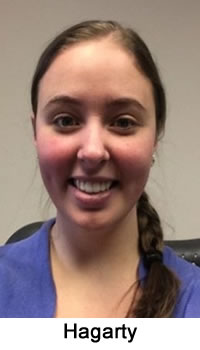Caitlyn Hagarty, a senior in industrial engineering, and Amanda Smith, a senior in biomedical engineering, will be part of a team of University of Iowa students will visit India in January to help a world-renowned eye doctor provide vision care and cataract surgery to more poor patients.
They are among 12 students who will spend two weeks at the Aravind Eye Hospital in the city of Madurai, looking at the organization’s operations and suggesting cost saving improvements. The clinic is known around the world for revolutionizing eye surgery to remove cataracts by turning the procedure into what is essentially an assembly line, says Bob Walker, a lecturer in the John Pappajohn Entrepreneurial Center who is co-organizing the trip. The process creates efficiencies and reduces expenses so that clinic has been able to perform 4 million surgeries since it opened in 1976, many of them for little or no cost to poor patients.
Hagarty is interning in the University of Iowa Hospitals and Clinics’ office that oversees its continuous improvement and LEAN management programs. She’s looking forward to

Smith serves as a biomedical engineering peer advisor, has done a co-op experience at Boston Scientific, is vice president of the Society of Women Engineers, is an Engineering Ambassador, has been a burn treatment center volunteer mentor at the University of Iowa Hospitals & Clinics, and has served as an orientation guide and campus tour guide. She also has been a participant and site leader for Spring Break Service Learning, executive board volunteer direct of Medicus, and has participated in Dance Marathon and Leadership Institute.

The students taking the Health Care and Entrepreneurship class are from the College of Public Health, College of Engineering, and Tippie College of Business, most of them studying for careers in logistics and process improvement. Their task will be to find further operating efficiencies that will allow the hospital to expand its services further, in particular to make eye care more accessible to the poor. Finding efficiencies will be a challenge—the hospital has a gross margin of 40 percent, even though 70 percent of the patients pay nothing or close to it, so it’s pretty efficient already. But Walker says that will be one of the learning opportunities for the students, who will face similar efficiency-wringing situations once they’ve started their careers.
“They’ll observe operations and intake procedures, patient processing, post-operation follow-up, and visit the hospital’s field clinics in cities outside of Madurai,” says Walker, who is co-organizing the trip with his wife, Kristy, chief information officer of UI Health Enterprises who teaches health care informatics in the College of Public Health. “They’ll also analyze how the use of telemedicine can make the clinic more efficient.”
Walker says the students will present their findings and proposals to the clinic’s managers before returning to the United States.